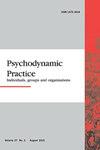Conviction, commonality/context, and culture in psychoanalytic/psychodynamic supervision: My personal perspective
IF 0.4
Q4 PSYCHOLOGY, CLINICAL
引用次数: 0
Abstract
I subsequently summarize the quintessentials of my talk, “Core Quintessentials of Psychoanalytic/Psychodynamic Supervisory Thought and Action: In Three Parts”, presented to the British Association for Psychoanalytic/Psychodynamic Supervision, 8 October 2022. I give focus to three ever fundamental, foundational areas: (a) the anchoring convictions that ground my supervisory perspective (the supervision foundation upon which I stand); (b1) my search to identify the crucial commonalities that animate my own supervisory practice and perhaps bind us all together as supervisors (a common factors, common processes, common practices perspective); and (b2) my complementary effort to accordingly propose an explanatory framework within which those binding commonalities could be situated (the Contextual Psychoanalytic/Psychodynamic Supervision Relationship Model); and (c) my struggle to work at forever making culture an integral part of who I am, how I think, and how I act as a supervisor (striving to incorporate a multicultural orientation into my practice and bring the Cultural Third to life). I offer these personal sharings, my personal perspective (along with perspective-consistent references), in hopes of stimulating further reader reflection, dialogue, and conversation about these core matters of quintessential psychoanalytic/psychodynamic supervisory importance.精神分析/精神动力监督中的信念、共性/情境和文化:我的个人观点
我随后总结了我谈话的精髓,“精神分析/精神动力监督思想和行动的核心精髓:分三部分”,提交给英国精神分析/精神动力监督协会,2022年10月8日。我将重点放在三个最基本的基础领域:(a)奠定我的监管观点的锚定信念(我所立足的监管基础);(b1)寻找关键的共性,使我自己的管理实践充满活力,并可能将我们所有人作为管理者联系在一起(共同因素、共同过程、共同实践的视角);(b2)我的补充努力,相应地提出一个解释性框架,在这个框架中,这些具有约束力的共性可以被置于其中(情境精神分析/心理动力学监督关系模型);(c)我努力使文化永远成为我是谁、我如何思考、我如何作为主管的一个组成部分(努力将多元文化取向纳入我的实践,并将文化的第三种带入生活)。我提供这些个人分享,我的个人观点(以及观点一致的参考),希望能激发读者进一步思考,对话,以及关于这些典型的精神分析/精神动力学监督重要性的核心问题的对话。
本文章由计算机程序翻译,如有差异,请以英文原文为准。
求助全文
约1分钟内获得全文
求助全文
来源期刊

Psychodynamic Practice
PSYCHOLOGY, PSYCHOANALYSIS-
CiteScore
0.90
自引率
0.00%
发文量
41
期刊介绍:
Psychodynamic Practice is a journal of counselling, psychotherapy and consultancy and it is written for professionals in all fields who use psychodynamic thinking in their work. The journal explores the relevance of psychodynamic ideas to different occupational settings. It emphasizes setting and application as well as theory and technique and focuses on four broad areas: •Clinical practice •The understanding of group and organisational processes •The use of psychodynamic ideas and methods in different occupational settings (for example, education and training, health care, social work, pastoral care, management and consultancy) •The understanding of social, political and cultural issues
 求助内容:
求助内容: 应助结果提醒方式:
应助结果提醒方式:


